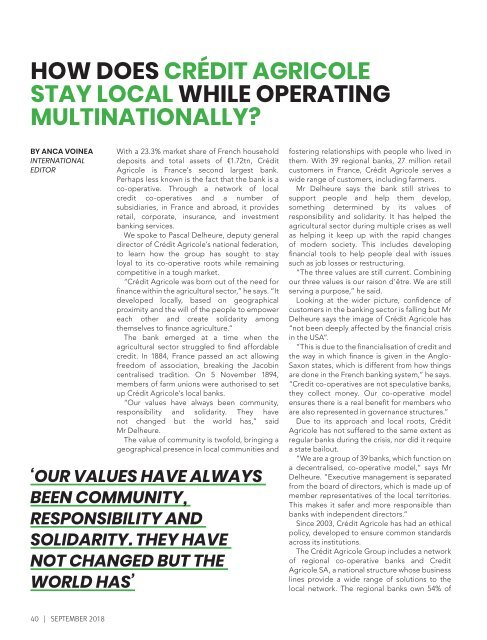SEPTEMBER 2018
The September edition of Co-op News looks at how co-ops cab maintain co-operative values and principles while operating in competitive markets and how this can be a challenge for large co-ops. We examine current research into what influences a co-op’s take on the traditional values of self-help, self-responsibility, democracy, equality, equity and solidarity.
The September edition of Co-op News looks at how co-ops cab maintain co-operative values and principles while operating in competitive markets and how this can be a challenge for large co-ops. We examine current research into what influences a co-op’s take on the traditional values of self-help, self-responsibility, democracy, equality, equity and solidarity.
Create successful ePaper yourself
Turn your PDF publications into a flip-book with our unique Google optimized e-Paper software.
HOW DOES CRÉDIT AGRICOLE<br />
STAY LOCAL WHILE OPERATING<br />
MULTINATIONALLY?<br />
BY ANCA VOINEA<br />
INTERNATIONAL<br />
EDITOR<br />
With a 23.3% market share of French household<br />
deposits and total assets of €1.72tn, Crédit<br />
Agricole is France’s second largest bank.<br />
Perhaps less known is the fact that the bank is a<br />
co-operative. Through a network of local<br />
credit co-operatives and a number of<br />
subsidiaries, in France and abroad, it provides<br />
retail, corporate, insurance, and investment<br />
banking services.<br />
We spoke to Pascal Delheure, deputy general<br />
director of Crédit Agricole’s national federation,<br />
to learn how the group has sought to stay<br />
loyal to its co-operative roots while remaining<br />
competitive in a tough market.<br />
“Crédit Agricole was born out of the need for<br />
finance within the agricultural sector,” he says. “It<br />
developed locally, based on geographical<br />
proximity and the will of the people to empower<br />
each other and create solidarity among<br />
themselves to finance agriculture.”<br />
The bank emerged at a time when the<br />
agricultural sector struggled to find affordable<br />
credit. In 1884, France passed an act allowing<br />
freedom of association, breaking the Jacobin<br />
centralised tradition. On 5 November 1894,<br />
members of farm unions were authorised to set<br />
up Crédit Agricole’s local banks.<br />
“Our values have always been community,<br />
responsibility and solidarity. They have<br />
not changed but the world has,” said<br />
Mr Delheure.<br />
The value of community is twofold, bringing a<br />
geographical presence in local communities and<br />
‘OUR VALUES HAVE ALWAYS<br />
BEEN COMMUNITY,<br />
RESPONSIBILITY AND<br />
SOLIDARITY. THEY HAVE<br />
NOT CHANGED BUT THE<br />
WORLD HAS’<br />
fostering relationships with people who lived in<br />
them. With 39 regional banks, 27 million retail<br />
customers in France, Crédit Agricole serves a<br />
wide range of customers, including farmers.<br />
Mr Delheure says the bank still strives to<br />
support people and help them develop,<br />
something determined by its values of<br />
responsibility and solidarity. It has helped the<br />
agricultural sector during multiple crises as well<br />
as helping it keep up with the rapid changes<br />
of modern society. This includes developing<br />
financial tools to help people deal with issues<br />
such as job losses or restructuring.<br />
“The three values are still current. Combining<br />
our three values is our raison d’être. We are still<br />
serving a purpose,” he said.<br />
Looking at the wider picture, confidence of<br />
customers in the banking sector is falling but Mr<br />
Delheure says the image of Crédit Agricole has<br />
“not been deeply affected by the financial crisis<br />
in the USA”.<br />
“This is due to the financialisation of credit and<br />
the way in which finance is given in the Anglo-<br />
Saxon states, which is different from how things<br />
are done in the French banking system,” he says.<br />
“Credit co-operatives are not speculative banks,<br />
they collect money. Our co-operative model<br />
ensures there is a real benefit for members who<br />
are also represented in governance structures.”<br />
Due to its approach and local roots, Crédit<br />
Agricole has not suffered to the same extent as<br />
regular banks during the crisis, nor did it require<br />
a state bailout.<br />
“We are a group of 39 banks, which function on<br />
a decentralised, co-operative model,” says Mr<br />
Delheure. “Executive management is separated<br />
from the board of directors, which is made up of<br />
member representatives of the local territories.<br />
This makes it safer and more responsible than<br />
banks with independent directors.”<br />
Since 2003, Crédit Agricole has had an ethical<br />
policy, developed to ensure common standards<br />
across its institutions.<br />
The Crédit Agricole Group includes a network<br />
of regional co-operative banks and Credit<br />
Agricole SA, a national structure whose business<br />
lines provide a wide range of solutions to the<br />
local network. The regional banks own 54% of<br />
40 | <strong>SEPTEMBER</strong> <strong>2018</strong>


















